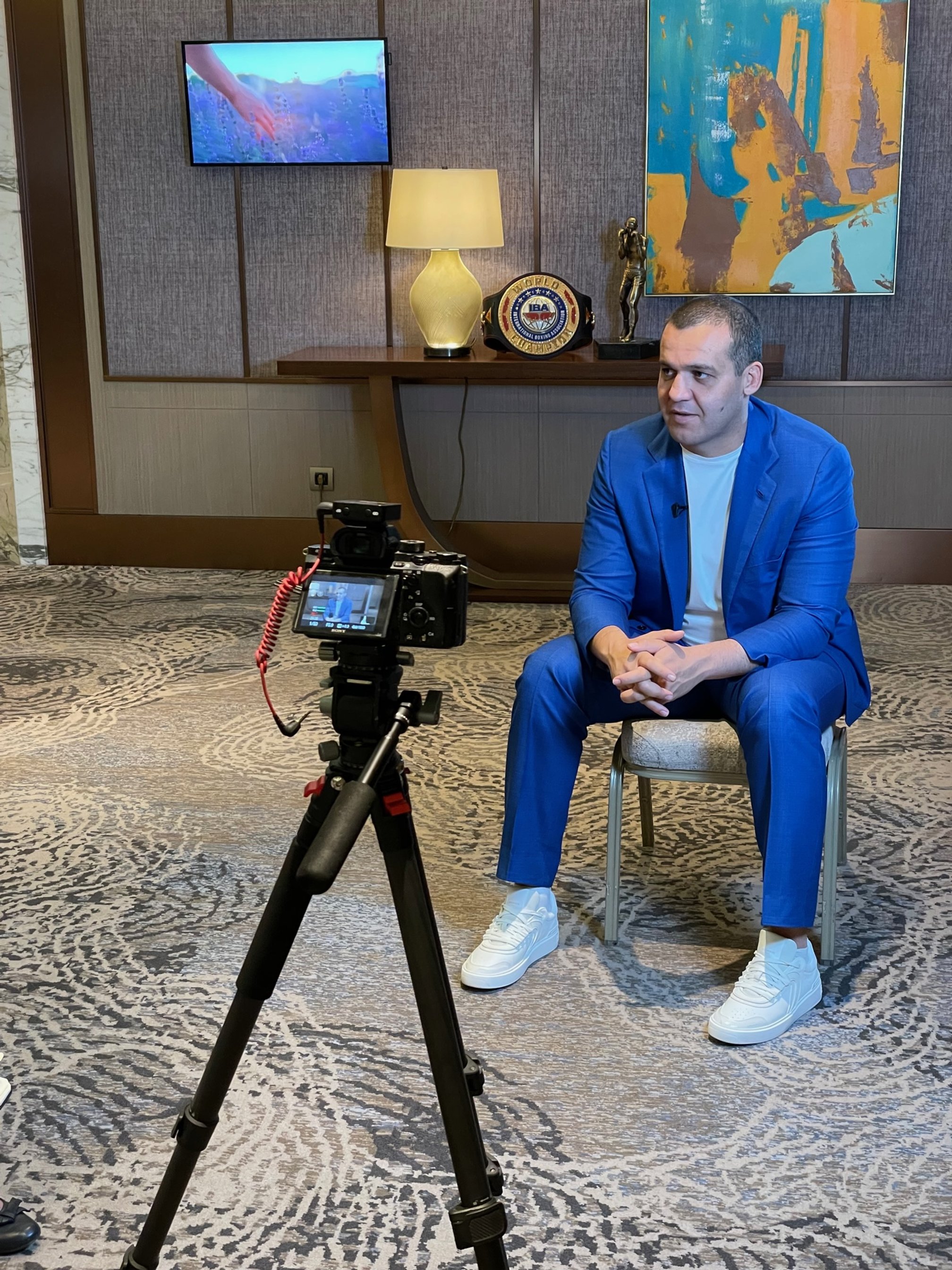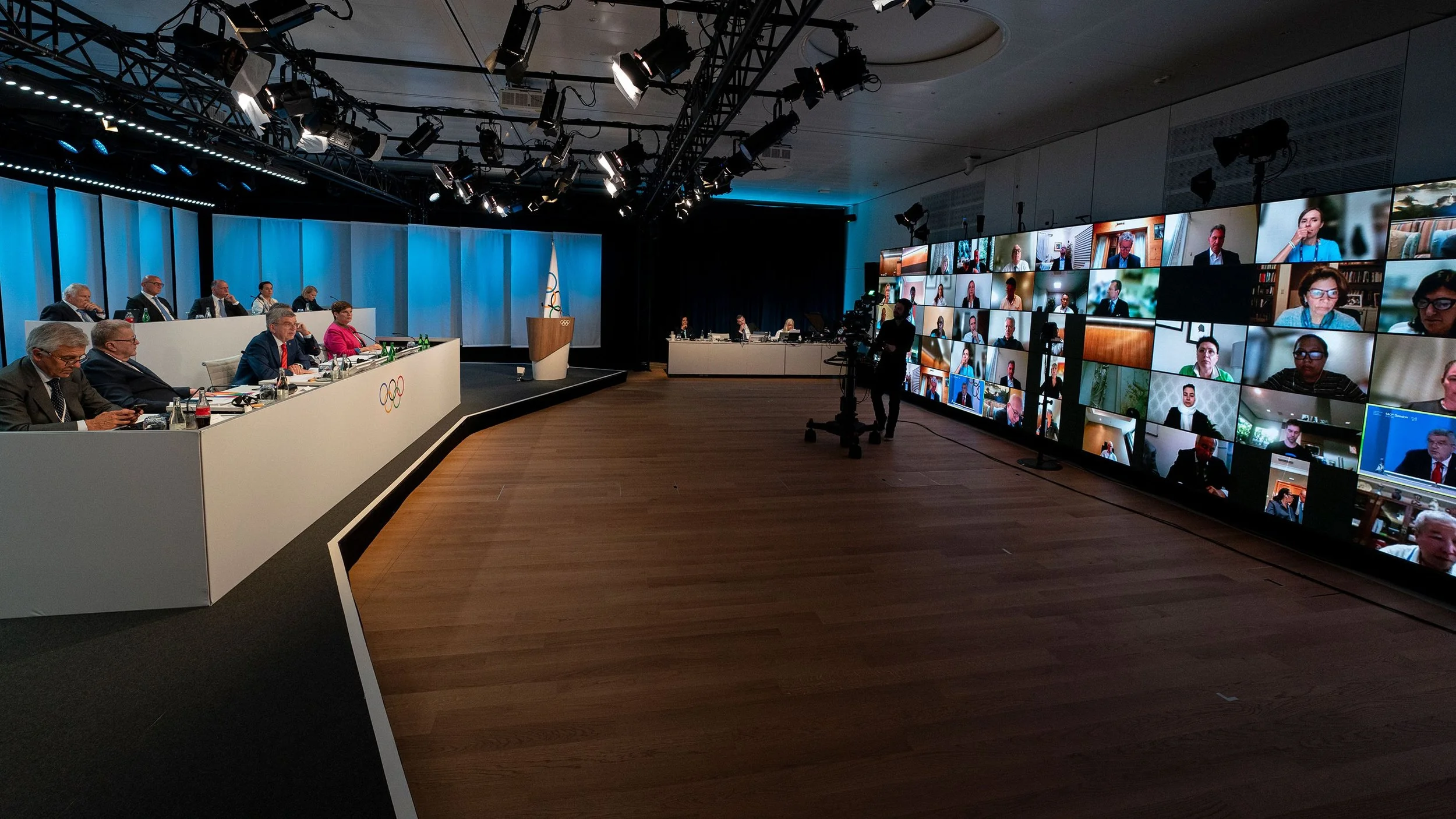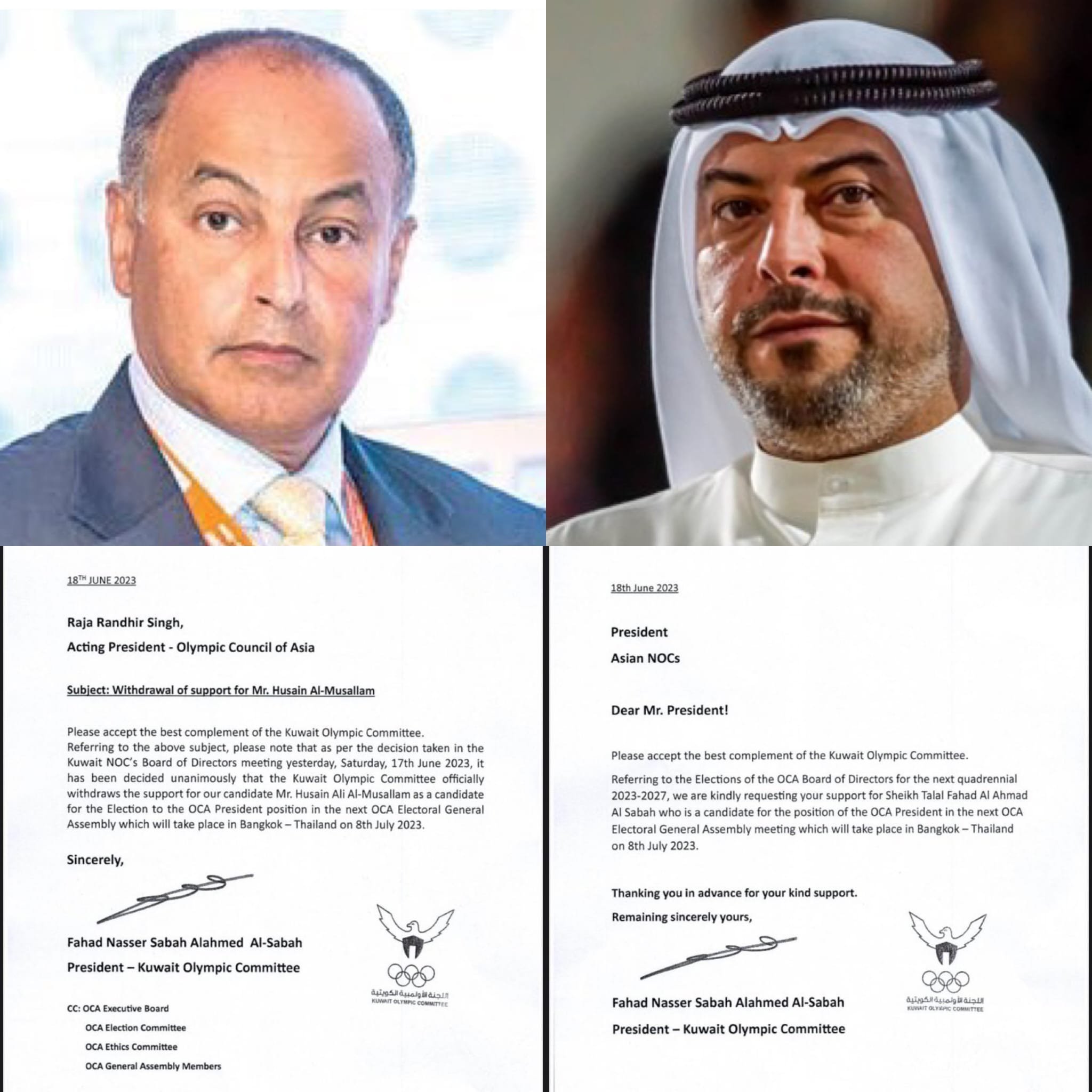If Umar Kremlev, president of the International Boxing Association, was named, say, Bill Jones, and he was not Russian, then all of everything that has been at the root of the problem with the IBA and the International Olympic Committee would very likely have been solved long ago.
Instead, in a historic decision, the IOC membership, by a vote of 69-1, decided Thursday to banish the IBA into the Olympic wilderness – or, in its formal language, withdraw the federation’s recognition.
The vote was predictable. Under president Thomas Bach, the members rarely if ever deviate from the recommendations of the IOC executive board.
IBA president Umar Kremlev
The IOC dates to 1894. The vote Thursday is believed to be the first time in those 128 years it has severed ties with a sport’s federation. The action means zero for boxing in Paris for 2024 and Los Angeles for 2028. Boxing will be on the program. Who will run it? That’s a question.
The bigger question: will the IOC ultimately be proven on the right side of history?
The easy temptation, especially for those in the West, is to say, yes, and not only yes, but a resounding yes. All the same, we live in changing times. As the world nears the end of the first quarter of the 21st century, lines are shifting in significant ways a great number of people and nations of the West are having fundamental trouble not only understanding but even recognizing.
This is why the IBA is a case study, a leading example of what is not only now but what is coming in global sport in this 21st century. And why, despite his many rough edges, Umar Kremlev is leading what may well be a revolution. And why, too, the ultimate answer to this big-picture question may well be – no.
--
Those rough edges:
A few days ago, Kremlev, speaking in Brazil, was reported to have said about one of his predecessors as federation president, C.K. Wu, “IOC are hiding the crimes of their IOC member and IOC board member … such people must be shot as he has robbed the national federations, the boxers, has brought in corruption.”
This shocked the IOC’s PR apparatus, which usually operates in vanilla anodyne mode, into something akin to defibrillator DefCon 5, the organization issuing a statement that said, “Making accusations against them that they are ‘covering up crimes’ is highly defamatory,” even though a rational person would find enough evidence in a June 2022 report issued by the law professor Richard McLaren to interest any reasonable prosecutor so inclined to undertake an investigation.
Then, on Thursday, in response to the IOC vote, the IBA issued an “official communication” in which, first sentence, it declared the IOC had “made a tremendous error” that “revealed its true politicized nature,” and then, second sentence, went on to assert, “It is noteworthy that on this very day, 82 days ago, fascist Germany launched an attack on the peaceful citizens of the Soviet Union, resulting in the escalation of war and a devastating human tragedy.”
It will not have passed unnoticed that Bach is German, Kremlev Russian, the Russians vividly remember in their national soul the 24 million civilian and military dead in World War II. That said, for a Russian to compare the post-war German president of the IOC to the leader of that fascist state, arguably the most evil human in the history of the 20th century, particularly when Bach is himself passionately committed to an organization devoted to peace-building, is – over-the-top beyond.
For the IOC, this sort of rhetoric indisputably confirms its position. How could it do anything but banish such an individual? How could he do anything but forfeit the right to lead such an outlaw federation?
Now look at it from Kremlev’s position.
Not to defend the rhetoric in that IBA statement. There is no defending any comparison – even if the man’s name is not articulated – to Hitler. None.
Kremlev has been elected IBA president not once but twice, the first time in December 2020, the second time in May 2022 to a full four-year term.
When he was first elected, he was advised to try a charm offensive with the IOC, in the hope of getting the IBA back in good graces in time for the Paris 2024 Games.
He could not get a meeting with anyone in Lausanne.
Meantime, the IBA undertook real reform. It struck a deal with Gazprom that erased the millions in debts the federation had accrued under Wu. It started paying big bucks to its championship winners -- $200,000 to the 2023 men’s gold medalists in Tashkent, Uzbekistan, $100,000 to the women’s winners in New Delhi. By 2027, the plan is men’s winners will get $1 million. At IBA competitions, per McLaren, the draw and scoring are run not by IBA but by employees of Swiss Timing – a key change to address if not defeat a culture of cheating that has long plagued the sport.
None of this seemed to matter.
“They are intransigent,” McLaren said in a telephone interview before Thursday’s vote, referring to the IOC. “They are firmly of the view the IBA has not reformed. And they’re not prepared to listen to me or the sport itself – to meet with them or have put in front of them evidence of change.”
The IOC’s session Thursday at which by a 69-1 vote IBA recognition was withdrawn // IOC / Greg Martin
Having tried the nice guy approach for some months, Kremlev switched gears. He decided, well, f-it.
He couldn’t get a meeting? He decided to speak his mind.
Boxing is not exactly rhythmic gymnastics. You give hits. You take some. Even to the head. There are rules. No hitting below the belt. Same with the rhetoric. No Hitler. But some provocative speech comes with the territory. It’s – boxing.
Again, though – Kremlev could not get a meeting. No one at the IBA could.
Charm didn’t work. Good manners didn’t. Rough and ready didn’t. Nothing did. So – what to do?
When the IOC controls the ring, what’s the action plan?
This makes for an interesting lesson, a fascinating precedent after 128 years, for other international federations, almost all of whom are entirely dependent on the IOC not only for their well-being but, if we are together being honest, for their existence.
--
The IOC model since the 1980s has depended on U.S. television revenue. That model very likely will find itself under considerable stress in the very near future, actually in the next IOC presidency, because the NBC deal ends in 2032, the next presidency beginning in 2025. IOC global TV ratings are down 14.28%, from 3.5 billion to 3 billion, in the nine years from London 2012 to Tokyo 2020/1. Cable is fast giving way to streaming. Problem, big problem: no one has yet figured out how to monetize streaming in the same way cable generated enormous scads of cash.
Now, hypothetically, since the door has been opened after 128 years, let’s say the IOC, ever in search of teens and 20-somethings, decides – let’s pick ABC, it no longer wants archery, badminton or canoeing (again, hypothetically) – what is to stop the IOC from doing to those federations, or any federation, what it did to boxing?
Don’t think these federations haven’t noticed. And felt a shiver of panic.
This is why some in those federations secretly – even if they would never, ever say so for the record – admire Kremlev for speaking up.
What he has figured out, though, is what they have not: how to have a considerable revenue stream separate and apart from the IOC: in particular, the IBA world championships, men’s and women’s, underwritten entirely by host cities.
And host cities around the world are lining up to stage them.
This, too, is evidence of how the world is changing.
Where was Kremlev last week amid all the controversy?
Meeting with the president of Venezuela, Nicolas Maduro Moros, at his residency, the Miraflores Palace in Caracas.
Maduro not to your taste? People, this is 2023. The WTA is back doing business with China after all that noise before the Beijing Winter Games in 2022 about Peng Shuai. The PGA Tour, bleeding millions in legal fees and looking at treble damages in an antitrust case if a jury went sideways, announced it is going to be in business with the Saudi-led LIV Golf.
In April, Bach traveled to China. There he met with that nation’s No. 2, premier Li Qiang, among others. Who else traveled about the same time to China? Kremlev. There he was met at the Shaolin Temple by 20,000 people. More, high-level discussions were held about staging an IBA championship in any of a number of cities.
The new player on the scene: World Boxing. So far, the United States and Swiss boxing associations are in with this new organization, which has a long way to go before it is remotely functional.
Meantime, the bloc of nations that elected Kremlev not once but twice has considerably more in common with the likes of China and Venezuela than the nations of the West that would be inclined to join World Boxing.
Do these nations want to be lectured by the United States about “values”? After leaving millions of girls and women to the Taliban in Afghanistan? When the Americans and their constitution and “due process” have been holding prisoners for 20 years at Guantanamo?
Plus, the essential thing that has the IOC so freaked out – Kremlev’s reputed ties to Vladimir Putin, president of the Russian federation – is now absolutely, positively guaranteed to be a factor in whatever comes next. Word is the Russian federation president is not pleased, not pleased at all, about events that culminated in Thursday’s vote.
How might that play out?
--
The Olympic Council of Asia election, set for July 8, will see Husain al-Musallam, the World Aquatics president, now widely perceived as an Olympic insider, against another member of the al-Sabah clan – Talal al-Fahad al-Sabah. Both are from Kuwait.
Intrigue from the National Olympic Committee of Kuwait
Be mindful: Kuwaiti Olympic politics are not for the genteel. Just because the board of directors says one thing does not mean it necessarily carries the day. This is an Olympic committee that for several years, until 2019, was suspended for “undue government interference.”
Why does any of this matter?
Long-time observers will remember that Sheikh Ahmad, also Kuwaiti, helped Bach get elected IOC president in 2013 but has mostly been in self-imposed exile since late 2018 due to a forgery case in Switzerland, a circumstance his supporters find just a little too preciously convenient. Sheikh Ahmad did not relinquish his OCA role until September 2021. The sheikh has consistently denied any wrongdoing.
How much political capital is it worth the Russians, along with their former Soviet client states and others in their sphere of influence, to invest in trying to defeat al-Musallam? That is, to take Sheikh Ahmad’s side? Bach’s term is up in a short two years. The sheikh has always been in it for the long game, and he is still, comparatively speaking, a young man – just 59.
Again, why, though, does this matter?
The casual observer will recall that the play to get the Russians qualified for Paris 2024 runs through Asia, in events overseen by the OCA. Nominally, this was an idea approved last December as floated by the acting OCA president, India’s Randar Singh. It is commonly understood that only an Olympic insider with serious juice could pull this off. That does not describe Singh. Who is in exile and who is now seen as the Olympic insider?
If Sheikh Ahmad mounts an end-around, how much uncertainty would that throw into the Russians-through-Asia play for Paris? Any? None? A lot?
Next:
Putin has already signaled an interest in bringing together some number of nations for a mirror Olympics of sorts, a “Friendship Games” or a “BRICS Games” that would presumably feature the likes of Brazil, South Africa, India, China and others, key players in the bloc behind Kremlev’s ascent. Where is the IOC assembly this October? In Mumbai.
And, let’s not forget, the rising powers of the Gulf states, where money is limitless. Qatar of course put on the 2022 men’s soccer World Cup. Saudi Arabia will put on the 2029 Asian Winter Games – the Winter Games. Qatar will stage the 2030 Asian Games, the Saudis the 2034 Asian Games.
Where, increasingly, is the money in international sport?
It costs money to put on big events. This is in large measure why voters in Western nations started saying no to the Games in referendums. It’s why the IOC changed the way it picks its sites; it got rid of glamor campaigns and elections and now quietly engages in “dialogue” with would-be hosts.
For emphasis: the United States has never – never – staged a world swimming championship.
Is it any wonder why when countries in the Global South and the Gulf and the Far East increasingly step up to stage mega-sports events, they find pressure campaigns from the West – where taxpayers increasingly have signaled they don’t want to pay for such events – to be, let’s say, a disconnect?
Would Putin be willing to throw limitless money at a “Friendship Games”? Sochi 2014 cost a reported $51 billion, and even if that figure can’t be verified, those Games without question ran into the tens of billions.
The far more existential question:
How fundamental a thrust is what happened Thursday? That is, might it represent a serious blow to the Olympics as an idea?
What if – this is not unthinkable – expelling the IBA proves a tipping point that prompts the Russians to skip Paris 2024?
Many in the West might rejoice.
This would be wrong. Entirely wrong.
The war in Ukraine is indefensible. All the same, the many nations of the world are not lined up behind Ukraine. Far from it. Beyond, the fundamental premise of the Olympic Games is to bring all the nations of the world together. All means all. As Bach has said, and many times, it’s not a peace-building exercise if you only bring to the party only those with whom you agree.
Bach and other serious people in Lausanne and elsewhere are only too keenly aware of all these notions. He gave voice to these concerns Thursday at the IOC session: “We will have Games of political bloc A, Games of political bloc B and separate Games for countries who don't want to align themselves. Universal Olympic Games will no longer be possible, World Championships in the true sense will no longer be possible."
This is why what happened – what is happening – with the IBA is of such import.
Which is also why any strategist now advising the IBA had to have thought of this already because, as ever, money talks:
Have your world championships the week before the Olympics. And instead of waiting for 2027, pay your winners $1 million immediately if not sooner. Like 2024.
To quote The Clash – should I stay or should I go?




